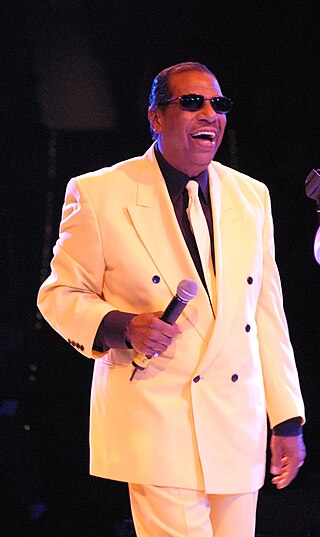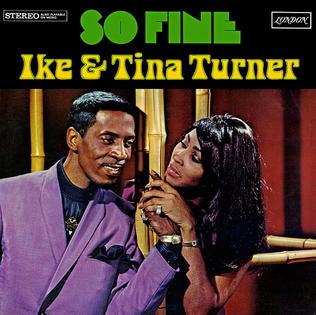
Doo-wop is a genre of rhythm and blues music that originated in African-American communities during the 1940s, mainly in the large cities of the United States, including New York, Philadelphia, Pittsburgh, Chicago, Baltimore, Newark, Detroit, Washington, D.C., and Los Angeles. It features vocal group harmony that carries an engaging melodic line to a simple beat with little or no instrumentation. Lyrics are simple, usually about love, sung by a lead vocal over background vocals, and often featuring, in the bridge, a melodramatically heartfelt recitative addressed to the beloved. Harmonic singing of nonsense syllables is a common characteristic of these songs. Gaining popularity in the 1950s, doo-wop was "artistically and commercially viable" until the early 1960s, but continued to influence performers in other genres.
Chicago soul is a style of soul music that arose during the 1960s in Chicago. Along with Detroit, the home of Motown, and Memphis, with its hard-edged, gritty performers, Chicago and the Chicago soul style helped spur the album-oriented soul revolution of the early 1970s.

Novelty and fad dances are dances which are typically characterized by a short burst of popularity. Some of them, like the Twist, Y.M.C.A. and the Hokey Pokey, have shown much longer-lasting lives. They are also called dance fads or dance crazes.
The "Chicken Dance", also known and recorded as Der Ententanz,Tchip Tchip,Vogerltanz, the Bird Song, the Chicken Song, the Birdie Song, the Bird Dance,Danse des Canards, the Duck Dance,El Baile de los Pajaritos,Il Ballo del Qua Qua,Check Out the Chicken, or Dance Little Bird, is an oom-pah song; its associated fad dance has become familiar throughout the Western world. The song was composed by accordion player Werner Thomas from Davos, Switzerland, in the 1950s.

Zephire Andre Williams was an American R&B musician who started his career in the 1950s at Fortune Records in Detroit. His most famous songs include the hits "Jail Bait", "Greasy Chicken", "Bacon Fat" (1957) and "Cadillac Jack" (1966). He was also the co-author of the R&B hit "Shake a Tail Feather".
The Avons were a British pop vocal group. Originally composed of Valerie Murtagh and Elaine Murtagh, and known as 'The Avon Sisters', they added Raymond S. Adams, and changed their name to 'The Avons'.
Shep and the Limelites was an American doo-wop trio of the early 1960s, composed of James "Shep" Sheppard, Clarence Bassett and Charles Baskerville. They are best known for their 1961 hit recording, "Daddy's Home", co-written by Sheppard.
The Miracles were the Motown Record Corporation's first group and its first million-selling recording artists. During their nineteen-year run on the American music charts, the Miracles charted over fifty hits and recorded in the genres of doo wop, soul, disco, and R&B. Twenty-six Miracles songs reached the top 10 of the Billboard R&B singles chart, including four R&B number ones. Sixteen charted within the top 20 of the Billboard Hot 100, with seven reaching the top ten and two – 1970's "The Tears of a Clown" and 1975's "Love Machine" – reaching #1. A third song, the million-selling "Shop Around", reached #1 on the Cash Box magazine pop chart. The Miracles also scored 11 U.S. R&B top 10 albums, including 2-#1's.

The Five Satins are an American doo-wop group, best known for their 1956 million-selling song "In the Still of the Night." They were formed in 1954 and continued performing until 1994. When it was formed, the group consisted of six members, which was eventually cut down to five. The group is in the Vocal Group Hall of Fame.
The Olympics are an American doo-wop group, formed in 1957 by lead singer Walter Ward. The group also included Eddie Lewis, Charles Fizer (tenor), Walter Hammond (baritone), and Melvin King (bass). With the exception of Lewis, all were friends in a Los Angeles, California, high school.
Lee Andrews & the Hearts were an American doo-wop quintet from Philadelphia, Pennsylvania, United States, formed in 1953. They recorded on the Gotham, Rainbow, Mainline, Chess, United Artists, Grand and Gowen labels. Managed by Kae Williams, in 1957 and 1958 they had their three biggest hits, "Tear Drops", "Long Lonely Nights" and "Try the Impossible".
"Shake a Tail Feather" is a song written by Otha Hayes, Verlie Rice, and Andre Williams and originally recorded in 1963 by the Chicago-based group the Five Du-Tones. The original recording reached #28 on Billboard's Hot R&B Singles chart and #51 on the Hot 100.

The Mark IV were an American musical ensemble, based in Chicago, consisting of Bob Peterson, Leon McGeary, William (Bill) Thomas, and Michael McCarthy. They were originally named The Rhythm Makers. They later changed their name to Mark V, and then – as members left – to The Mark IV, and eventually ending in the 1980s as The Mark IV Trio. The band appears to have recorded only as The Mark IV, however, and they had their biggest hit in 1959 with the novelty song, "I Got a Wife". "I Got a Wife" was set to a lively polka beat, and reached No. 24 in US Billboard Hot 100 chart, and No. 14 on Canadian radio station CHUM's "Chum Chart". The song was later covered by Frankie Yankovic and other polka bands.
The Dreamlovers were an American doo wop group from Philadelphia, Pennsylvania.

Doo-Wops & Hooligans is the debut studio album by American singer-songwriter Bruno Mars. It was released on October 4, 2010, by Atlantic and Elektra Records and was made available to listen before its official release on September 24, 2010. After the release of the EP It's Better If You Don't Understand, Mars's writing and production team, the Smeezingtons, began working on the album with Needlz, Supa Dups and Jeff Bhasker as producers. The album title was chosen to reflect simplicity and appeal to males and females.
Earl Lee Nelson, who also performed as Jackie Lee, was an American soul singer and songwriter. He started his career in the doo-wop group the Hollywood Flames in the 1950s before founding the R&B duo Bob & Earl with Bobby Byrd. As Jackie Lee, he's best known for his hit song "The Duck".

The Willows are an American doo-wop group formed in Harlem, New York, in 1952. The group was an influential musical act that performed into the mid-1960s and had a Top 20 R&B hit with "Church Bells May Ring", a song which was covered with greater commercial success by The Diamonds.

So Fine is a studio album by Ike & Tina Turner released on Pompeii Records in 1968.
One-derful Records was an independent R&B and soul label based in Chicago. Founded by George Leaner in 1962, One-derful was one of the few black-owned labels in Chicago until its demise in 1968. The label is most known for the release of "Shake a Tail Feather" by the Five Du-Tones in 1963. Other artist on the label included the Sharpees, McKinley Mitchell, Alvin Cash, and Harold Burrage. A few subsidiary labels were launched: Mar-V-Lus, M-Pac, Halo, and Midas Records.







